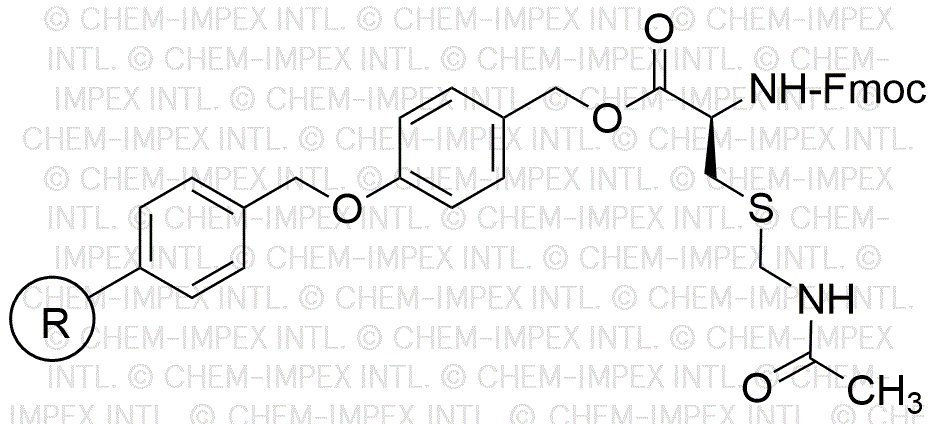Fmoc-S-acetamidomethyl-L-cysteine 4-alkoxybenzyl alcohol resin is widely utilized in research focused on:
- Peptide Synthesis: This resin is primarily used in solid-phase peptide synthesis, allowing researchers to efficiently create complex peptides for various applications in drug development and biotechnology.
- Bioconjugation: The resin facilitates the attachment of peptides to other biomolecules, enhancing the development of targeted therapies and diagnostic tools in the pharmaceutical industry.
- Custom Drug Development: Its unique properties enable the design of customized drug candidates, particularly in cancer research, where specific targeting of tumor cells is crucial.
- Protein Engineering: Researchers leverage this resin in the modification of proteins, which can lead to improved stability and functionality, essential for therapeutic applications.
- Analytical Chemistry: It is also used in the preparation of samples for mass spectrometry, aiding in the identification and quantification of biomolecules in various research fields.
Información general
Propiedades
Seguridad y normativas
Aplicaciones
Fmoc-S-acetamidomethyl-L-cysteine 4-alkoxybenzyl alcohol resin is widely utilized in research focused on:
- Peptide Synthesis: This resin is primarily used in solid-phase peptide synthesis, allowing researchers to efficiently create complex peptides for various applications in drug development and biotechnology.
- Bioconjugation: The resin facilitates the attachment of peptides to other biomolecules, enhancing the development of targeted therapies and diagnostic tools in the pharmaceutical industry.
- Custom Drug Development: Its unique properties enable the design of customized drug candidates, particularly in cancer research, where specific targeting of tumor cells is crucial.
- Protein Engineering: Researchers leverage this resin in the modification of proteins, which can lead to improved stability and functionality, essential for therapeutic applications.
- Analytical Chemistry: It is also used in the preparation of samples for mass spectrometry, aiding in the identification and quantification of biomolecules in various research fields.
Documentos
Hojas de datos de seguridad (HDS)
La SDS proporciona información de seguridad completa sobre la manipulación, el almacenamiento y la eliminación del producto.
Especificación del producto (PS)
La PS proporciona un desglose completo de las propiedades del producto, incluida la composición química, el estado físico, la pureza y los requisitos de almacenamiento. También detalla los rangos de calidad aceptables y las aplicaciones previstas del producto.
Certificados de análisis (COA)
Busque certificados de análisis (COA) ingresando el número de lote del producto. Los números de lote y de partida se pueden encontrar en la etiqueta de un producto después de las palabras "Lote" o "Lote".
Número de catálogo
Número de lote/lote
Certificados de origen (COO)
Este certificado de origen confirma el país en el que se fabricó el producto y también detalla los materiales y componentes utilizados en él y si se deriva de fuentes naturales, sintéticas u otras fuentes específicas. Este certificado puede ser necesario para cumplir con las normativas aduaneras, comerciales y regulatorias.
Número de catálogo
Número de lote/lote
Hojas de datos de seguridad (HDS)
La SDS proporciona información de seguridad completa sobre la manipulación, el almacenamiento y la eliminación del producto.
DownloadEspecificación del producto (PS)
La PS proporciona un desglose completo de las propiedades del producto, incluida la composición química, el estado físico, la pureza y los requisitos de almacenamiento. También detalla los rangos de calidad aceptables y las aplicaciones previstas del producto.
DownloadCertificados de análisis (COA)
Busque certificados de análisis (COA) ingresando el número de lote del producto. Los números de lote y de partida se pueden encontrar en la etiqueta de un producto después de las palabras "Lote" o "Lote".
Número de catálogo
Número de lote/lote
Certificados de origen (COO)
Este certificado de origen confirma el país en el que se fabricó el producto y también detalla los materiales y componentes utilizados en él y si se deriva de fuentes naturales, sintéticas u otras fuentes específicas. Este certificado puede ser necesario para cumplir con las normativas aduaneras, comerciales y regulatorias.


